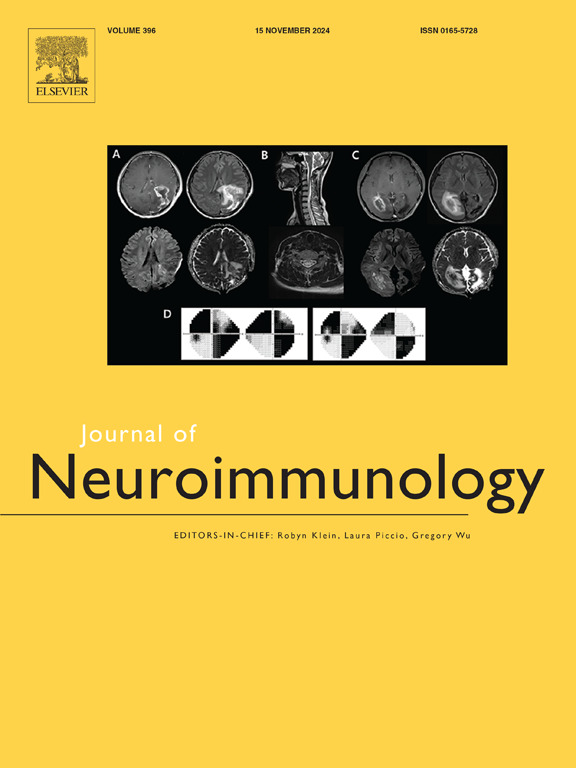MOGAD presenting as fulminant intracranial hypertension
IF 2.9
4区 医学
Q3 IMMUNOLOGY
引用次数: 0
Abstract
Objectives
Myelin oligodendrocyte glycoprotein antibody disease (MOGAD) has an expanding phenotype. We describe two cases of MOGAD with associated severe intracranial hypertension.
Case 1: A 21-year-old male presented with diffuse cortical encephalitis and intracranial hypertension with both serum and CSF MOG antibody positivity. Initial brain CT scan was normal but subsequent demyelination was evident on MRI. Case 2: A 44-year-old female presented with a progressive brainstem encephalitis and intracranial hypertension and normal MRI, with later development of subcortical demyelination which was confirmed on brain biopsy. CSF-restricted MOG antibody was detected following the biopsy results.
Results
Both patients presented with clinical features of severe intracranial hypertension requiring surgical management followed by immunosuppressive therapy (methylprednisone and plasma exchange; and intravenous immunoglobulin and plasma exchange) leading to clinical improvement.
Discussion
MOGAD should be in the differential diagnosis of acute severe intracranial hypertension even in the absence of demyelination on initial neuroimaging. Clinicians should be alert of this syndrome that requires combined management of intracranial pressure in addition to early and intensive immunotherapy.
表现为暴发性颅内高压的 MOGAD。
目的:髓鞘少突胶质细胞糖蛋白抗体病(MOGAD)的表型不断扩大。我们描述了两例伴有严重颅内高压的 MOGAD 病例。病例 1:21 岁男性,弥漫性皮质脑炎和颅内高压,血清和脑脊液 MOG 抗体均阳性。最初的脑 CT 扫描结果正常,但随后的核磁共振检查发现脱髓鞘现象明显。病例 2:一名 44 岁女性患者出现进行性脑干脑炎和颅内高压,核磁共振成像正常,后来出现皮层下脱髓鞘,脑活检证实了这一点。活检结果出来后,检测到了脑脊液限制性 MOG 抗体:结果:两名患者均表现为严重颅内高压的临床特征,需要手术治疗,随后接受免疫抑制治疗(甲基强的松和血浆置换;静脉注射免疫球蛋白和血浆置换),临床症状有所改善:讨论:即使最初的神经影像学检查没有发现脱髓鞘,MOGAD 也应作为急性重度颅内高压的鉴别诊断之一。临床医生应警惕这种综合征,除了早期强化免疫治疗外,还需要对颅内压进行综合管理。
本文章由计算机程序翻译,如有差异,请以英文原文为准。
求助全文
约1分钟内获得全文
求助全文
来源期刊

Journal of neuroimmunology
医学-免疫学
CiteScore
6.10
自引率
3.00%
发文量
154
审稿时长
37 days
期刊介绍:
The Journal of Neuroimmunology affords a forum for the publication of works applying immunologic methodology to the furtherance of the neurological sciences. Studies on all branches of the neurosciences, particularly fundamental and applied neurobiology, neurology, neuropathology, neurochemistry, neurovirology, neuroendocrinology, neuromuscular research, neuropharmacology and psychology, which involve either immunologic methodology (e.g. immunocytochemistry) or fundamental immunology (e.g. antibody and lymphocyte assays), are considered for publication.
 求助内容:
求助内容: 应助结果提醒方式:
应助结果提醒方式:


